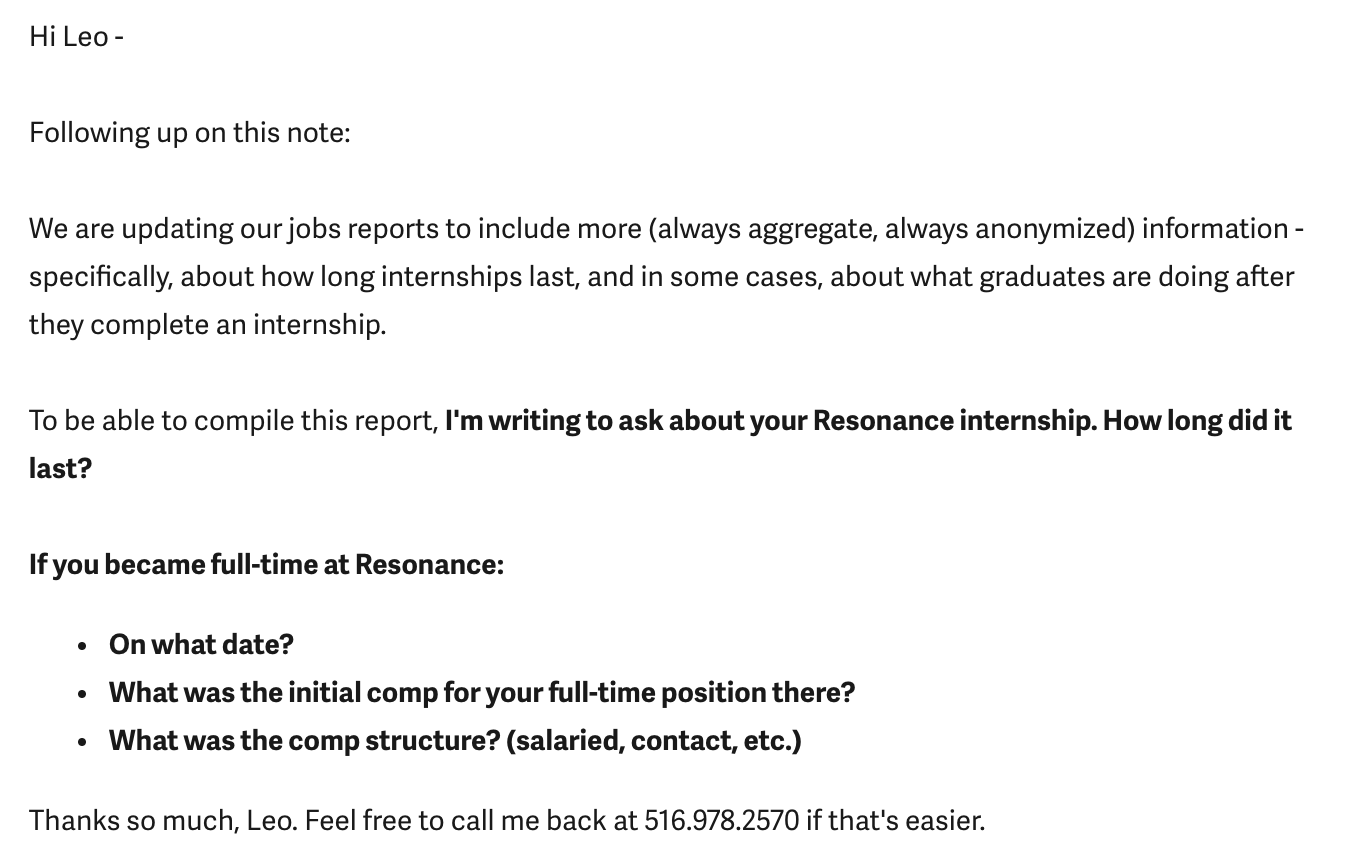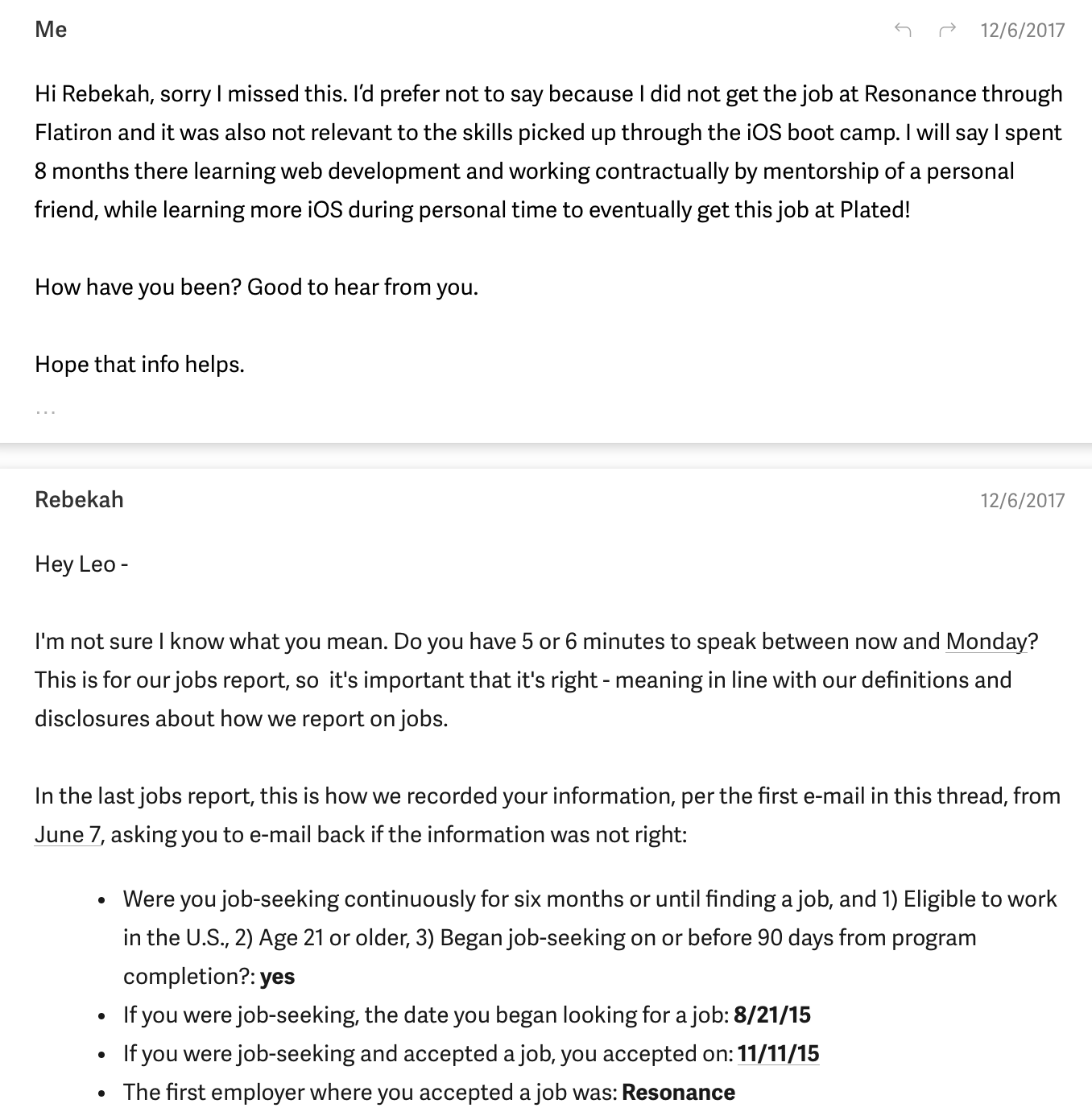Coding bootcamps lie, but join one anyway.

Table of Contents
The coding bootcamp I attended in 2015 lied to me.
These nontraditional three-month bootcamps used to advertise something along the lines of, "Earn 80k after graduating!". The lies caught up with the Flatiron School and the program got hit with a lawsuit in 2017.
Many bootcamps adjusted to the pushback and now offer a 'money back guarantee' if you don't land a job 3-6 months after graduating. Keep in mind though, this refund policy will have caveats, likely preventing you from rejecting an offer you don't like or intentionally tanking your interviews to recoup your tuition.
Even though I struggled during my post-grad experience, I still support anyone in their early-mid 20s is to take a coding course— even if it's with a lawsuit-dealt bootcamp like Flatiron School.
Not 1 class. Not a weekend intro coding assignment. Invest a point in your early career towards multi-month coding course/bootcamp.
Ironically, the barrier-to-entry into junior tech employment is unbelievably high, given that these jobs can be learned and done from home. It took me over six months of studying after a 3-month bootcamp before landing an entry-level job.
Small businesses can manage their entire online presence with a team or single person social savvy & technical enough to operate a WYSIWYG admin dashboard.
Even if you have a job (assuming non-technical/coding)- consider taking a coding course, or sign up for a self-paced or immersive (full-time) coding bootcamp. If you love your job you or have already confirmed programming is not for you, then carry on; this advice isn't for you.
I recommend trying at least two months of commited and scheduled coding classes. Those two months alone won't do you any good on the job market (unless you're gifted and were better off getting a computer science degree in the first place). What those two months do is make clear to you whether you’ll hate programming.
If you don't dread a lifestyle of working in front of a screen all day, then you should consider a life's career in software development!
Life's career. Learning in tech never ends, primarily because the tools and platforms programmers rely on change constantly (Think iOS 8 vs iOS 15). Keep this in mind when considering a transition into tech.
I specify my advice for people in their early-mid 20s because I just remember the amount of hours, sadness, fear and doubts I fought through in getting a real job. I was 24 when I started learning to code; I don't think I'd make it through in tech if I started today at 30. It was easier to work and study 996 (9am to 9pm, 6 days a week).
Anyways you're not me, so take my perspective with doubt. I'm also at a better place in my life than at 25. Strong determination defies age.
Oh- and about bootcamps lying, yeah what the fuck.
Like I mentoned at the start, Flatiron School was sued for misleading students, and they eventually terminated the mobile development course I enrolled in there. I'm guessing the school had a mounting pile of unemployed iOS students with no answer for them.
From the lawsuit:
The Attorney General’s investigation also uncovered that Flatiron made inflated claims on its website concerning the percentage of its graduates who obtained employment after completing their courses and the average salaries of their graduates. For example, between January and June 2017, Flatiron claimed that 98.5% of its students received employment less than 180 days after graduation and that Flatiron graduates had an average salary of $74,447. However, Flatiron did not disclose clearly and conspicuously that the 98.5% employment rate included not only full time salaried employees but also apprentices, contract employees and self-employed freelance workers, some who were employed for less than twelve weeks.
(WeWork has since acquired the Flatiron School and its full-stack web development program appears healthier than what I signed up for in 2015)
This is how Flatiron School lied to me
You know- my mother was pissed that I was tossing away my bachelor's in kinesiology. I also turned down NYU's physical therapy post-grad program.
My first job post-bootcamp was a miracle through an unexpected friendship. A student-athlete I worked with (and now a dear friend) offered me a part-time coding job— not even to code what I learned at Flatiron School. He offered to mentor me, and those 7 months gave me enough time to continue studying and eventually land a full-time iOS job at Plated.
Emphasis: landing this job had nothing to do with Flatiron School.
So I started working at Plated, a meal-kit startup that featured on Shark Tank. I met awesome people and some of my closest friends at Plated.
One random day, I get an email from an advisor from Flatiron School who helped students with finding jobs post bootcamp.
This is what I get:

Uhm... no? My first gig was a blessing, and my job at Plated was the result of daily studying, coding and cold-calling/job applying for months. I don't want my employment history tied in anyway to Flatiron School's metrics, fuck that.

I did not reply back. I don't even remember filling out this information. If I did I was naive. I couldn't find the email where I explicitly provided the numbers above, so I may have disclosed the information on a phone call with one of Flatiron's career advisors and they flat out entered my answers into their job reports data.
Shaking my head. It grinds my gears so much thinking this might have happened.
I'm not as mad that Flatiron School could not help me land a job. It's easier for some students than others, I get that. But don't tie my current job to your marketing numbers if you know damn well you didn't help me land it.
Despite the fake numbers, the classmates and teachers I met at Flatiron were incredible. I don't regret learning to code one bit, despite the hardships in landing the first job.
Stay encouraged, keep studing and never stop cold emailing and applying for jobs. Best of luck.


